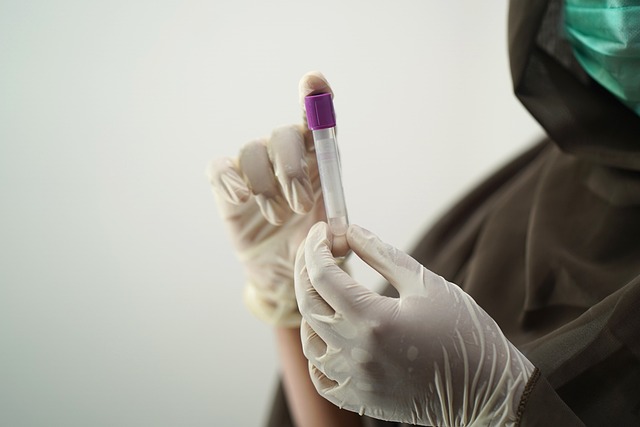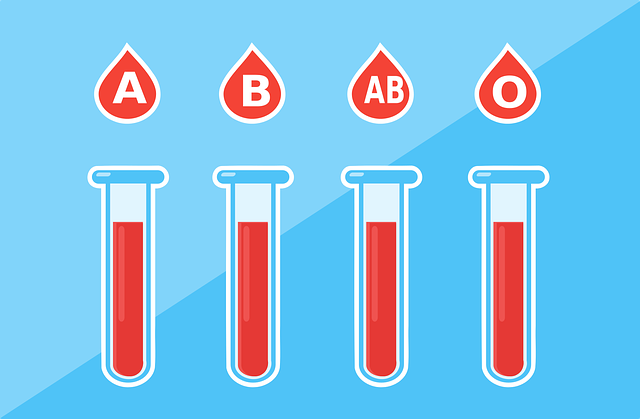The UK Standard Thyroid Blood Test is a pivotal diagnostic tool for healthcare professionals addressing male reproductive health issues. It provides essential measurements of thyroxine (T4), triiodothyronine (T3), and thyroid-stimulating hormone (TSH) levels, which are crucial indicators of thyroid function directly impacting testosterone production and spermatogenesis in men. Imbalances in these hormones can lead to reproductive health problems such as infertility, erectile dysfunction, and poor sperm quality. The test also aids in identifying the effects of thyroid disorders like hypothyroidism and hyperthyroidism on male reproductive capabilities and metabolism, which can influence libido and fertility. Given its non-invasive nature, the UK Standard Thyroid Blood Test offers vital insights into thyroid health, enabling personalized treatment plans that consider both biochemical results and patient symptoms for a comprehensive approach to diagnosing and managing thyroid-related reproductive disorders in men. Its role in integrating hormone analysis with clinical symptomatology underscores its significance in improving patient outcomes within the realm of male reproductive health.
Understanding the intricate interplay between male hormones and reproductive health is pivotal for accurate diagnosis and effective treatment. A key factor in this medical domain is the analysis of hormone levels, particularly with respect to thyroid function—a crucial element often overlooked. This article delves into the significance of the UK Standard Thyroid Blood Test as a diagnostic tool, offering insights into its role in deciphering reproductive issues in males. By examining the integration of hormone analysis alongside clinical symptoms, healthcare providers can enhance their diagnostic precision and tailor treatment plans to meet individual patient needs more effectively. This exploration aims to shed light on the importance of comprehensive endocrine assessments in advancing men’s reproductive health care.
- Decoding Male Hormone Health: The Role of Thyroid Function in Reproductive Issues
- Understanding the UK Standard Thyroid Blood Test: A Key to Diagnosis
- Integrating Hormone Analysis with Clinical Symptoms for Accurate Diagnosis and Treatment Planning in Male Reproductive Health
Decoding Male Hormone Health: The Role of Thyroid Function in Reproductive Issues

Understanding the intricate relationship between male hormone health and thyroid function is pivotal in diagnosing and managing reproductive issues. The UK Standard Thyroid Blood Test serves as a foundational tool for healthcare professionals to assess thyroid activity, which can have profound effects on testosterone production and spermatogenesis. Elevated or low levels of thyroid hormones—thyroxine (T4) and triiodothyronine (T3)—can disrupt the delicate balance of male reproductive health, leading to a spectrum of reproductive issues such as infertility, erectile dysfunction, and suboptimal sperm quality. Monitoring thyroid function through the UK Standard Thyroid Blood Test is thus an essential aspect of a comprehensive diagnostic approach for males experiencing reproductive health concerns.
Furthermore, the correlation between thyroid dysfunction and male reproductive health extends beyond direct hormonal influences. Thyroid hormones play a critical role in metabolism, energy utilization, and overall systemic well-being, which are all factors that can indirectly impact reproductive capabilities. For instance, hypothyroidism, characterized by underactive thyroid function, can result in decreased libido and fertility due to its impact on various physiological processes. Conversely, hyperthyroidism, where the thyroid is overactive, can lead to increased estrogen production in men, further complicating reproductive health. Therefore, healthcare providers must consider thyroid function as a part of the diagnostic process when assessing male patients with reproductive issues, and the UK Standard Thyroid Blood Test is an indispensable tool in this clinical evaluation.
Understanding the UK Standard Thyroid Blood Test: A Key to Diagnosis

The UK Standard Thyroid Blood Test plays a pivotal role in the diagnosis and management of thyroid disorders, which are prevalent conditions affecting hormone levels within the endocrine system. This test primarily measures two key hormones: thyroxine (T4) and triiodothyronine (T3), alongside thyroid-stimulating hormone (TSH). T4 and T3 are essential thyroid hormones that regulate metabolism, growth, and development, while TSH is produced by the pituitary gland and stimulates the thyroid to produce these hormones. An imbalance of these hormones can lead to a range of reproductive issues in men, including altered spermatogenesis, reduced fertility, and hypogonadism. Interpreting the results of the UK Standard Thyroid Blood Test requires an understanding of the reference ranges specific to the UK population, which are established to reflect the hormone levels found in healthy individuals. This ensures accuracy in diagnosis and allows for personalized treatment plans tailored to the patient’s unique hormonal profile, thereby improving the chances of resolving reproductive issues effectively.
In clinical practice, the UK Standard Thyroid Blood Test is a non-invasive diagnostic tool that provides valuable insights into thyroid function. It is crucial for clinicians to consider the patient’s clinical presentation alongside these test results to arrive at an informed diagnosis. For instance, symptoms such as fatigue, weight changes, and mood disturbances can be indicative of thyroid dysfunction and should be correlated with the biochemical data obtained from the blood test. The integration of clinical acumen with objective laboratory findings enables healthcare providers to pinpoint the underlying thyroid pathology and devise appropriate interventions to address reproductive issues in men, thereby enhancing patient outcomes. Understanding the nuances of the UK Standard Thyroid Blood Test is essential for early diagnosis and effective management of thyroid-related reproductive disorders, underscoring its importance in modern medical practice.
Integrating Hormone Analysis with Clinical Symptoms for Accurate Diagnosis and Treatment Planning in Male Reproductive Health

In the realm of male reproductive health, the integration of hormone analysis with clinical symptoms plays a pivotal role in achieving accurate diagnoses and effective treatment planning. Clinicians in the UK often employ the UK Standard Thyroid Blood Test as a foundational tool to assess thyroid function, which is critical for overall hormonal balance. This test measures key parameters such as TSH (thyroid-stimulating hormone), free T4 (free thyroxine), and sometimes free T3 (free triiodothyronine) levels. The data obtained from this comprehensive evaluation aids in identifying any deviations from the normal range that could impact male reproductive health, such as hypothyroidism or hyperthyroidism. By correlating these biochemical findings with the patient’s clinical symptoms, healthcare providers can formulate tailored treatment strategies that address the underlying hormonal imbalances contributing to reproductive issues. This holistic approach ensures a more precise diagnosis and enhances the efficacy of therapeutic interventions, ultimately improving the prognosis for male patients experiencing reproductive health concerns.
Furthermore, the integration of hormone analysis with clinical symptomatology extends beyond thyroid function. It encompasses the examination of other hormones that influence male reproductive health, including sex hormones like testosterone, estradiol, and inhibin B, as well as other related parameters such as prolactin levels. The UK Standard Thyroid Blood Test serves as a benchmark for this comprehensive approach, ensuring that all relevant hormonal markers are considered in the diagnostic process. This nuanced analysis enables clinicians to pinpoint the exact hormonal deficiencies or excesses that may be causing male reproductive issues, leading to more personalized and effective treatment regimens. This precision in diagnosis and planning is crucial for improving patient outcomes and supporting the long-term health of males facing reproductive challenges.
In conclusion, the analysis of male hormone levels, particularly through the lens of thyroid function as outlined in “Decoding Male Hormone Health: The Role of Thyroid Function in Reproductive Issues,” is pivotal for the accurate diagnosis and effective management of reproductive issues. The UK Standard Thyroid Blood Test emerges as a critical diagnostic tool, providing clinicians with essential data to integrate with clinical symptoms. This integration, as discussed in “Integrating Hormone Analysis with Clinical Symptoms for Accurate Diagnosis and Treatment Planning in Male Reproductive Health,” underscores the importance of a comprehensive approach to male reproductive health. By adopting this methodology, healthcare providers can enhance their diagnostic precision, leading to tailored treatment plans that address the unique hormonal profiles of each patient. This approach not only facilitates better patient outcomes but also contributes to advancing the field of men’s health care in the UK and beyond.
